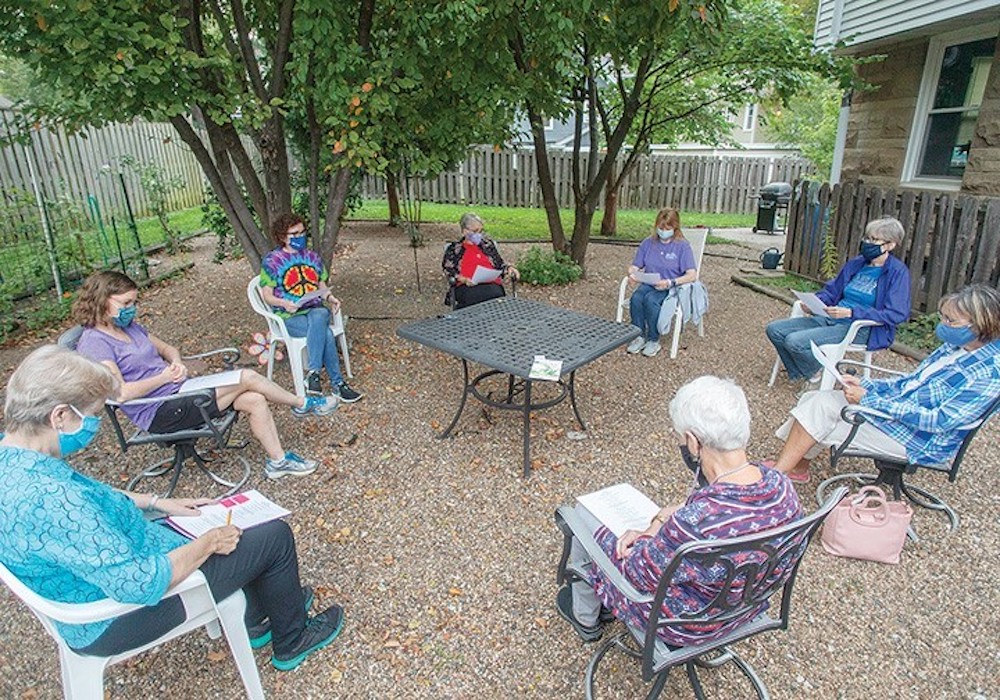
A woman's prayer group offered by Srs. Mary Barbara Wieseler and Elena Mack meets in the backyard of a Sisters of Charity of Leavenworth house in Kansas City, Kansas, during the pandemic. (Sisters of Charity of Leavenworth)
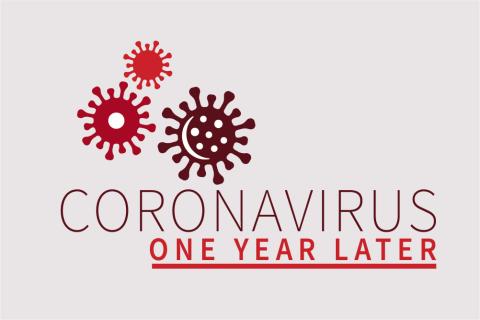
(NCR, GSR logo/Toni-Ann Ortiz)
Editor's note: As part of our Coronavirus: One Year Later coverage, we invited leaders of women's congregational associations to reflect on how the pandemic has affected religious life in their regions. Some provided overviews; others focused on their individual congregations as emblematic of shared experience. This entry is from three members of the National Board of the Leadership Conference of Women Religious (LCWR). LCWR represents about 80% of the women religious in the United States.
Technology became a lifeline for connecting, community
By Sr. Michelle Marie Stachowiak, Felician Sisters of North America
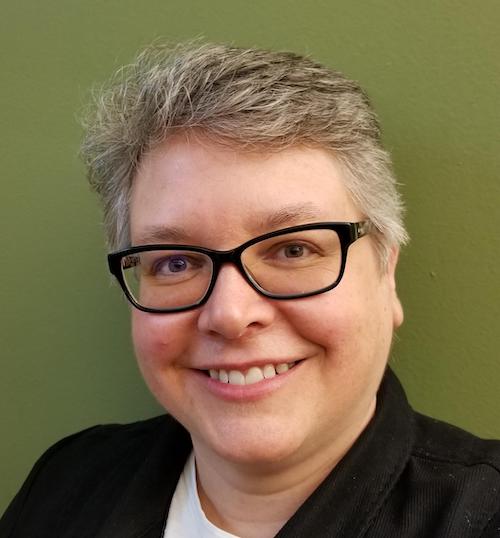
COVID-19 hit Felician Sisters of North America early and it hit us hard. Just a couple of weeks after the world began to shut down, we received word that there were infections in two of our largest convents, in New Jersey and Michigan. Our reality of congregate living, shared liturgy, prayers and meals, and the natural aging process left us completely vulnerable to this new virus. Our Lady of Hope Province, which encompasses North America, has lost 22 sisters to COVID-19.
The backdrop of this burgeoning crisis was a divided country with a populace that chose to politicize the pandemic. Science and politics locked horns. In those early days of the pandemic, with so much unknown and so many sisters becoming critically ill, misinformation and poor communication at the national level reigned. All people made difficult, painful choices for the sake of their families. Religious sisters were no different. Our decisions, made to protect the most vulnerable among us, went to the core of our identity when it became deadly to assemble.
As dark and difficult as the pandemic has been and despite significant loss of life, there have been learnings. What does it mean to be a member of a religious community when we can't assemble?
We had already been using technology in various ways, but suddenly it became a lifeline. Sisters in large convents wired with closed circuit TV found ways to pray together, separately, and like many Roman Catholics, participated in online Mass in cities throughout the world. Weekly Zoom gatherings for the entire North American province allowed sisters to pray, process and mourn together. Borders were closed, but hearts remained opened and hurting.
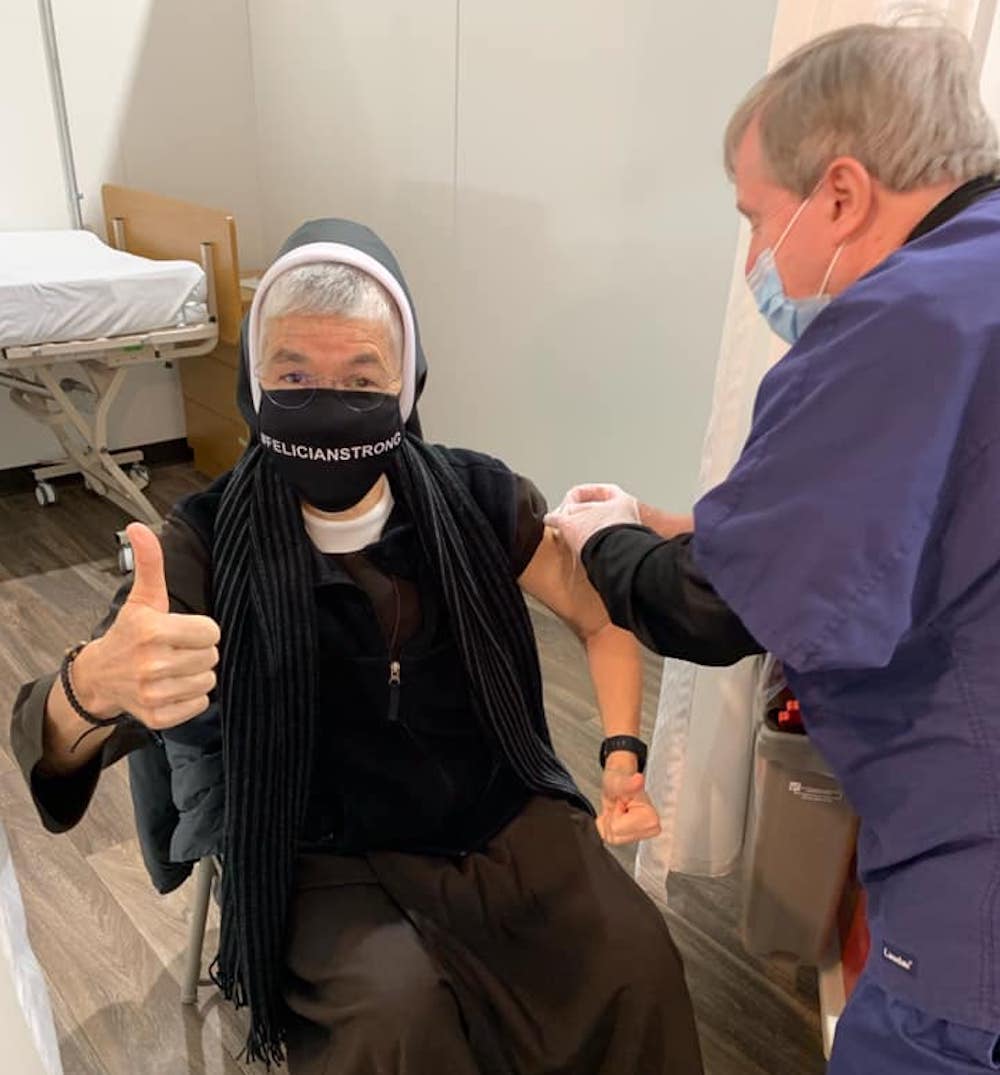
Felician Sr. Marilyn Minter receives her first dose of the COVID-19 vaccine at New Bridge Hospital in Paramus, New Jersey, before returning to serve at the Felician Mission in Haiti. (Felician Sisters of North America)
Mindful of our neighbors, the province donated extra to ministries that provide food for those needing it. Felician sisters partnered with Catholic Charities to help support those facing potential eviction as moratoriums were to be lifted. Ministries in healthcare, education and social service scrambled to find ways to continue serving in this strange new world. Sisters continued to minister as able, awaiting a vaccine, knowing the degree of suffering locally and in places like the Felician mission in Haiti. Sisters across the province prayed daily for all frontline workers, all infected with COVID-19, all in mourning and all lost to the virus.
Perhaps the most important lesson learned is what our faith teaches us: Life always triumphs over death. Even when living in mandated confinement in small rooms, even while recovering from the effects of COVID-19 infections for months, prayers continued. Participation in liturgy continued. Sacrificing for and with the world continued. Serving the needs of those around us continued. Strip away everything else, and what you see is what religious women have always been: Vowed to God, living the Gospel, in service to the world.
[Michelle Marie Stachowiak is a member of the Congregation of the Sisters of St. Felix of Cantalice. She serves as a member of the Provincial Council of Our Lady of Hope Province that encompasses North America, responsible for community life.]
Advertisement
Ways of experiencing support drastically changed
By Sr. Eileen Haynes, Sisters of Charity of Leavenworth
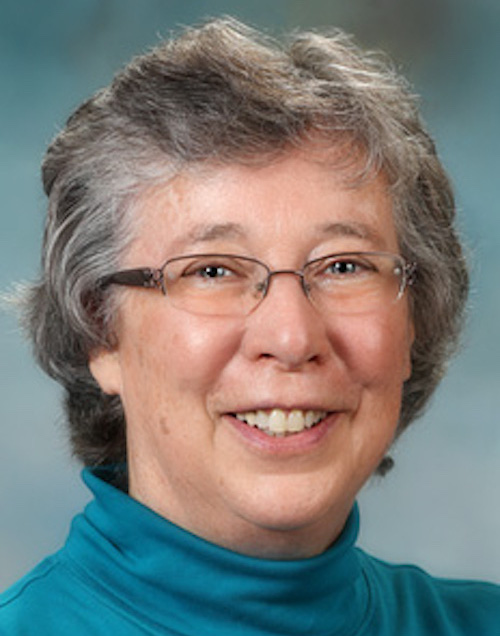 The vision of our eyes of faith have sharpened as we prayed with Scripture, identifying with our ancestors in their vulnerability and perceiving what is required of us in the critical needs of today. Persons of all ages helped us to treasure that our presence through prayer is essential in their lives.
The vision of our eyes of faith have sharpened as we prayed with Scripture, identifying with our ancestors in their vulnerability and perceiving what is required of us in the critical needs of today. Persons of all ages helped us to treasure that our presence through prayer is essential in their lives.
We learned to step into the "in your face" cognizance of the vulnerability of life and death, and our perception of community is being altered. As people reached out to us, asking us to accompany them in their fears, anxieties and day-to-day hardships dealt to them by the pandemic, we have a greater awareness that our level of anxiety is different as women religious. We have not needed to worry about having enough food on the table, paying monthly bills or finding another job to support family. Yet our ways of experiencing support — meeting in person with friends and mentors, receiving the Eucharist, communal celebrations and gatherings — drastically changed, and we needed to seek sustenance in new forms of presence. We turned to virtual gatherings, and some of us to the richness of the Liturgy of the Word in our local communities on a daily basis when participating at church wasn't an option.
From another perspective, our sisters in Peru discovered the rich connections that women religious possess throughout the country as they strove to meet the needs of Venezuelan migrants in this pandemic time.
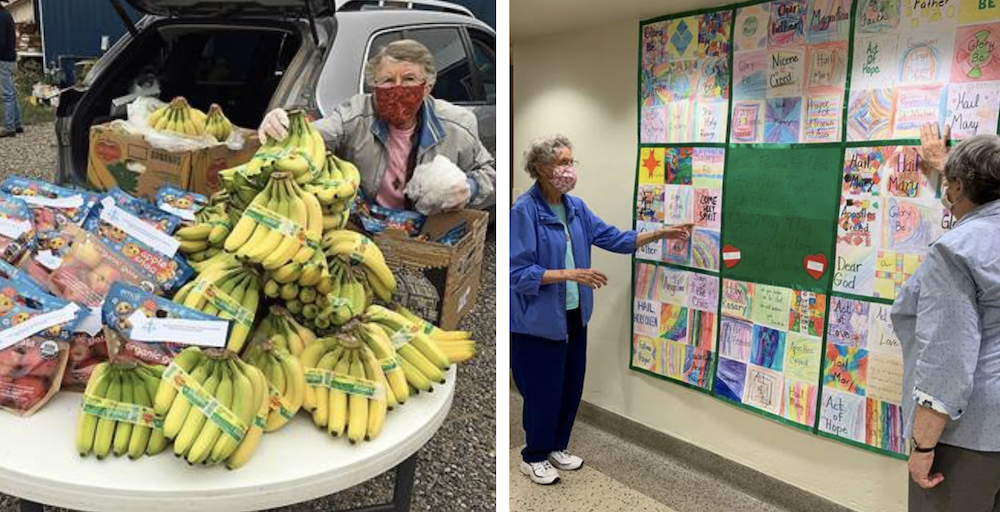
Left: Sr. Mary Lou Mendel, a Sister of Charity of Leavenworth, Kansas, unpacks fruit in Prior, Montana, where she and Sr. Sharon Smith have ministered since 2011. The Sisters of Charity of Halifax, who serve in the greater Boston area, shared a portion of their COVID-19 relief money to benefit the Crow Nation in Pryor during the pandemic, too, and some of those funds benefited the Arrow Creek Food Pantry. Right: Sisters of Charity of Leavenworth enjoy prayer quilts made by students from Xavier School in Leavenworth, Kansas, for sisters at the motherhouse and Ross Hall, the adjacent assisted living facility. The school also invited the sisters to be their prayer buddies, created a video, and made placemats. (Sisters of Charity of Leavenworth)
We understand a little bit more of integral ecology. The impact of the interconnectedness of the COVID-19 pandemic, racism and climate crisis has influenced, in some ways, the decisions we now make as individuals and as a congregation. Life seems to be less about "me" and more about "us." Becoming more human and truly honoring God's presence in each other. Being present to another, whoever that may be, is more essential than the doing. The gift of community has been broadened.
As the length of the quarantine grew, sisters began wondering, "Have we allowed our beings to become dormant in the midst of active ministry and day-to-day activities in the busyness of loving and serving?"
One sister reflected that she needed to learn how to be at peace in her room in quiet. She accepted that she had filled her days with activity and entertainment from social media, allowing relationships to become secondary. It's been a discovery more about ourselves, individually and collectively, and how we choose to live with the freedom God has blessed us with to create happiness/unhappiness for ourselves and beyond. Living in these times has provided an opportunity to see virtue in others that previously we had seen as annoyance. Perhaps we are learning to be comfortable in the space where we ask questions that don't have immediate and clear answers.
[Eileen Haynes serves on the leadership team for the Sisters of Charity of Leavenworth, Kansas.]
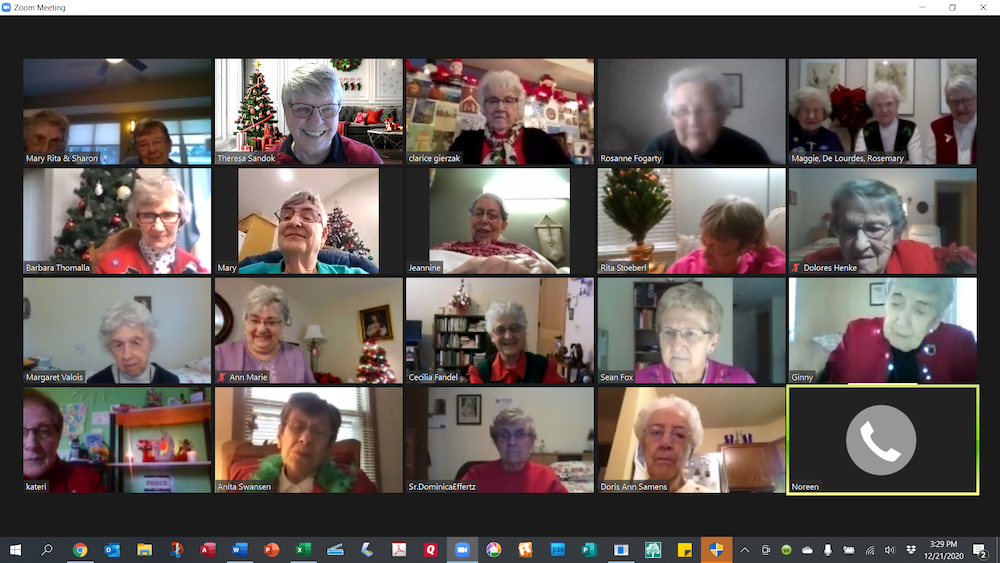
Ladysmith Servite Sisters celebrate a virtual Christmas during a Monday afternoon Servite Sisters online check-in in December 2020. (Servants of Mary of Ladysmith, Wisconsin screenshot)
Invitation to embark on virtual adventure
By Sr. Theresa Sandok, Servants of Mary (Servite Sisters)
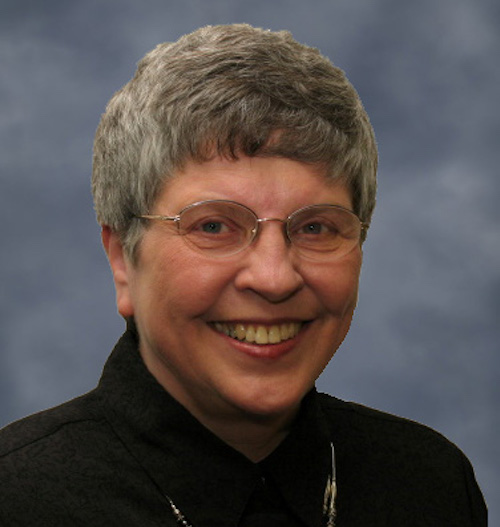 The "Year of COVID" flashes through my mind like a series of vignettes, the most poignant of which have to do with the sisters who have gone home to God. Death visited our little Servite community six times over the past year. We used to joke that when Sister Lucy died, the whole county would turn out for her funeral, so well known and loved was she. When she left us last April at age 95, the whole county stayed home. No funeral Mass, no eulogies, no sharing of memories — just a few masked mourners at her graveside, standing apart, standing in for the rest of us. As one sister put it, not being able to gather for such occasions "adds a special sadness to the situation."
The "Year of COVID" flashes through my mind like a series of vignettes, the most poignant of which have to do with the sisters who have gone home to God. Death visited our little Servite community six times over the past year. We used to joke that when Sister Lucy died, the whole county would turn out for her funeral, so well known and loved was she. When she left us last April at age 95, the whole county stayed home. No funeral Mass, no eulogies, no sharing of memories — just a few masked mourners at her graveside, standing apart, standing in for the rest of us. As one sister put it, not being able to gather for such occasions "adds a special sadness to the situation."
Yet as a community we have learned new ways to share these and other special moments in community life. On the afternoon of the fourth Monday of March last year, and every Monday afternoon since, we have gathered by Zoom for a Servite Sisters check-in. Our weekly meetings have taken on a comfortable rhythm of their own, beginning with a prayer, then news of what's happening in our lives, a discussion of some timely topic, a YouTube clip or song, and finally our goodbyes.
After the presidential inauguration, we spent time on Zoom reflecting on Amanda Gorman's inaugural poem, and then once again we marveled at her awesome presentation. At times our topics are light ("What is the most interesting place you've been?" "What would you like us to know about your grandparents") and at times soul searching ("How have we been complicit in racism and white privilege?" "What does Lent mean to you?").
Through these exchanges, we have come to know each other more deeply, and oddly we have COVID to thank for it. We would never have embarked on this virtual adventure were it not for the restrictions imposed by the pandemic, which intensifies our desire and need to connect. I know that as a community we are not alone in this. Throughout the country, throughout the world, groups and organizations, families and friends, are turning to technology to work, to play, to visit. It's a wonderful way of staying together while staying apart.
[Theresa Sandok is president of the Servants of Mary (Servite Sisters) of Ladysmith, Wisconsin, and professor emerita of philosophy at Bellarmine University, Louisville, Kentucky.]







